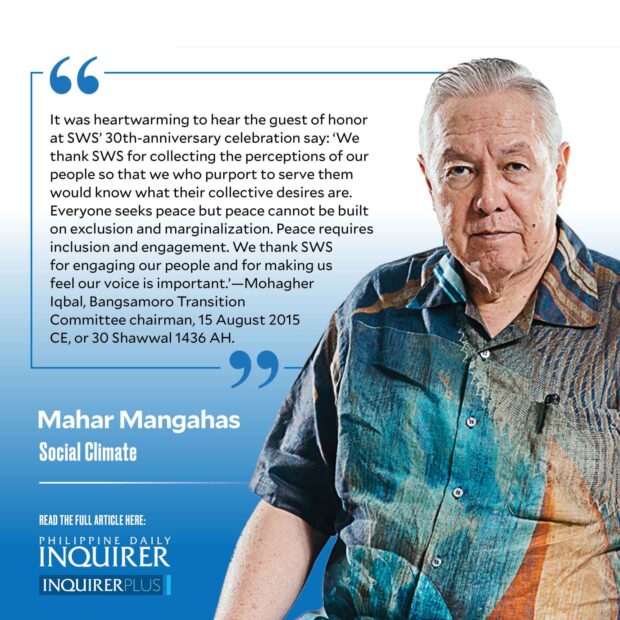9 Shawwal 1444 AH
Eid Mubarak to Filipino Muslims everywhere, and to Muslims in the Philippines. Having done an Easter piece six days after Holy Week, I will do an Eid’l Fitr piece today, my first opportunity after Ramadan, which ended on Thursday, April 20.
In the Islamic calendar, Ramadan is the ninth month, followed by Shawwal the 10th month. Today, the 29th of April in the year 2023 CE, is also the ninth of Shawwal in the year 1444 AH. CE stands for Common Era, which we all use and don’t attach anymore. It’s politically incorrect to call it Christian Era. It used to be called AD (anno domini, year of the Lord in Latin), on the principle that year 1 CE started when Jesus Christ was born.
However, scholars have long determined that Jesus was probably born between 6 BCE and 4 BCE (which means Before Common Era). The old initial BC, “Before Christ,” is no longer used by serious historians, of any religion. The year Jesus died, at age 33, was approximately 30 CE.
On the other hand, AH stands for anno hegirae (year of the hegira, meaning migration), when Muhammad the Prophet—here it is respectful to say PBUH, meaning Peace Be Unto Him—left with his family and followers from Mecca, where they were being persecuted and even threatened with death, to safety in Medina, 400 kilometers to the north.
I particularly like the story of their hiding in a cave, and being saved by a spider that spun a web over the cave’s mouth, throwing off their pursuers. There are similar spider stories about the saving of David from the angry King Saul, the saving of the Holy Family during their flight to Egypt, and the saving of Saint Felix of Nola (died 260 CE) from his persecutors. Aren’t Allah, Bathala, Dios, God, and Yahweh merely alternative names for the supreme spider-and-all-else-director?
After 10 years, the Prophet regrouped and returned in triumph to Mecca, where he died on 12 Rabee’ al-Awwal 11 AH, or the year 632 CE, at the age of 62.
Now, I will confess to learning just now about how the Islamic calendar works. But I have experienced Ramadan and lived in Muslim societies, in overseas Filipino worker stints in the 1970s, as an agricultural economist in Indonesia, and as a social indicators expert in Indonesia and Malaysia. Later I read the entire Quran, in connection with Social Weather Stations (SWS) work, though I am certainly no expert.
There is substantial survey research on Filipino Muslims. SWS’ work on this resulted in two publications: “The Code of Muslim Personal Laws in Practice: What Influential Muslims and Shar’ia Lawyers Think,” by Linda Luz Guerrero, Hamid Barra, myself, and Vladymir Joseph Licudine, SWS, 2007; and “Filipino Public Opinion on the Bangsamoro Basic Law and the Mamasapano Incident,” SWS, 2015.
The first is an analysis of a 2006 survey of 107 Filipino Shar’ia lawyers and 602 other influential Filipino Muslims (184 academics, 183 civil servants, 113 professionals, 98 religious leaders, and 24 traditional leaders; the great majority could read and write in Arabic).
The Philippines’ Code of Muslim Personal Laws was established by Presidential Decree No. 1083 (2/4/1977). This code is not Shar’iah itself, which is the divine and unalterable law from Allah, but is jurisprudence consistent with it and with the Philippine Constitution. Its provisions on marriage and inheritance, and how they work in practice, are particularly good for non-Muslims to know.
The second publication discusses a February 2015 survey of 1,500 adults in core territories of the Autonomous Region of Muslim Mindanao and 400 adults in nearby areas of Zamboanga City, Lanao del Norte, and Cotabato. It shows that the Mamasapano incident was only a temporary setback to the peace process.
SWS has done many surveys of Muslim Filipinos, particularly in the Bangsamoro Autonomous Region of Muslim Mindanao (BARMM, inaugurated 3/29/2019), and is pleased to continue doing so. These are commissioned surveys, which no doubt the sponsors immediately share with officials of BARMM and the national government. They are subject to a three-year embargo, after which the archived data are accessible to researchers. I hope Muslim Filipino organizations engage in similar work, inshallah.
It was heartwarming to hear the guest of honor at SWS’ 30th-anniversary celebration say:“We thank SWS for collecting the perceptions of our people so that we who purport to serve them would know what their collective desires are. Everyone seeks peace but peace cannot be built on exclusion and marginalization. Peace requires inclusion and engagement. We thank SWS for engaging our people and for making us feel our voice is important.”—Mohagher Iqbal, Bangsamoro Transition Committee chair, 15 August 2015 CE, or 30 Shawwal 1436 AH.
—————-
Contact: mahar.mangahas@sws.org.ph





















